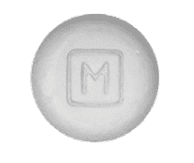Atropine / Diphenoxylate Dosage
Medically reviewed by Drugs.com. Last updated on Mar 10, 2025.
Applies to the following strengths: 0.025 mg-2.5 mg; 0.025 mg-2.5 mg/5 mL
Usual Adult Dose for:
Usual Pediatric Dose for:
Additional dosage information:
Usual Adult Dose for Diarrhea
Initial dose: 2 tablets or 10 mL (5 mg of diphenoxylate), orally, 4 times a day
Maintenance dose: Once control is achieved, reduce dose to individual requirements, to as little as 2 tablets or 10 mL once a day
Maximum dose: 20 mg diphenoxylate per day
Comments:
- Clinical improvement is usually seen within 48 hours.
- If no improvement is seen within 10 days, symptoms are unlikely to respond to further administration.
Usual Pediatric Dose for Diarrhea
2 years and older:
Initial dose: 0.3 to 0.4 mg/kg of diphenoxylate, orally, in 4 divided doses
Maintenance dose: Once control is achieved, reduce dose to individual requirements, to as little as one quarter of the initial daily dosage
Maximum dose: 20 mg diphenoxylate per day
Comments:
- These doses are approximate; adjust downward according to nutritional status and degree of dehydration.
- Reduce dose as soon as initial control of symptoms has been achieved.
- If no response within 48 hours, this medicine is unlikely to be effective.
- Use only the liquid medication in children under 13 years old; do not use tablets.
Renal Dose Adjustments
Data not available
Liver Dose Adjustments
Data not available
Precautions
Safety and efficacy have not been established in patients younger than 2 years.
Consult WARNINGS section for additional precautions.
Dialysis
Data not available
Other Comments
Patient advice:
- Do not exceed the recommended dosage.
- Keep out of reach of children and in a child resistant container.
- Overdosage may cause severe respiratory depression and coma, possibly leading to permanent brain damage or death.
- May cause drowsiness or dizziness; use caution regarding activities requiring mental alertness, such as driving or operating dangerous machinery.
- May potentiate the effects of alcohol, barbiturates, and tranquilizers.
More about atropine / diphenoxylate
- Check interactions
- Compare alternatives
- Pricing & coupons
- Reviews (69)
- Drug images
- Side effects
- During pregnancy
- Drug class: antidiarrheals
- En español
Patient resources
- Atropine and diphenoxylate drug information
- Diphenoxylate and atropine (Advanced Reading)
- Diphenoxylate and Atropine Tablets
- Diphenoxylate and Atropine Solution
Other brands
Lomotil, Lomocot, Lonox, Vi-Atro
Professional resources
- Diphenoxylate monograph
- Diphenoxylate and Atropine (FDA)
- Diphenoxylate and Atropine Oral Solution (FDA)
Other brands
Related treatment guides
See also:
Further information
Always consult your healthcare provider to ensure the information displayed on this page applies to your personal circumstances.


